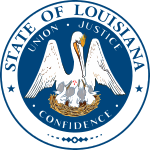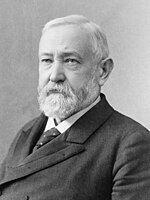| ||||||||||||||||||||||||||
| ||||||||||||||||||||||||||
 Parish Results
| ||||||||||||||||||||||||||
| ||||||||||||||||||||||||||
| Elections in Louisiana |
|---|
 |
|
|
The 1892 United States presidential election in Louisiana took place on November 8, 1892. All contemporary 44 states were part of the 1892 United States presidential election. State voters chose eight electors to the Electoral College, which selected the president and vice president.
Following the overthrow of Reconstruction Republican government, Louisiana, like most of the former Confederacy, established a Democratic-dominated but highly fraudulent political system[1] in which the dominant Bourbon planter class used the newly enfranchised blacks to protect their power against potentially threatening poor whites.[2] Outside of Acadiana — where French Catholic beliefs produced less hardline attitudes towards black voting[3] — intimidation would soon drastically reduce the number of black voters or, alternatively, count them for Democrats hostile to their interests.[4]
By the 1890s the Louisiana Republican Party was deeply divided between the establishment “black and tans” and an insurgent “lily white” faction led by Acadian sugar planters.[5] At the same time, there were major splits amongst the state’s white electorate,[4] formerly solidly Democratic because Louisiana completely lacked upland or German refugee whites opposed to secession.[6] The major parties would be challenged in the predominantly white hill parishes by the rise of the Populist Party due to declining conditions for farmers.[7] Both the Populists and the earlier Greenback Party — who shared key leaders like James B. Weaver — would eventually be supported by the state Republican Party,[8] but only after a five-way 1892 gubernatorial race won by “Anti-Lottery Democrat” Murphy J. Foster. This support would mean that Weaver would be absent from Louisiana’s presidential ballot later in the year, and the state would be won by the Democratic nominees, former President Grover Cleveland of New York and his running mate Adlai Stevenson I of Illinois. Although Cleveland won Louisiana by a landslide 53.06 percentage point margin, Populist support helped the Republicans carry several previously unanimously Democratic northern hill parishes.[7] However, this would prove the last time the Republicans won any parish in the state outside Acadiana until 1952, and the last time a parish outside Acadiana voted against the Democrats until 1948.[9]
- ^ Hair, William Ivy (1969). Bourbonism and agrarian protest; Louisiana politics, 1877-1900. pp. 114–115. ISBN 0807109088.
- ^ Inverarity, James M. (April 1976). "Populism and Lynching in Louisiana, 1889-1896: A Test of Erikson's Theory of the Relationship between Boundary Crises and Repressive Justice". American Sociological Review. 41 (2): 265–266.
- ^ Howard, Perry H. (1954). "A New Look at Reconstruction". Political Tendencies in Louisiana, 1812-1952; An Ecological Analysis of Voting Behavior (Thesis). LSU Historical Dissertations and Theses. pp. 112–113.
- ^ a b Dethloff, Henry C.; Jones, Robert R. (Autumn 1968). "Race Relations in Louisiana, 1877-98". Louisiana History: The Journal of the Louisiana Historical Association. 9 (4). Louisiana Historical Association: 301–323.
- ^ Heersink, Boris; Jenkins, Jeffrey A. Republican Party Politics and the American South, 1865-1968. pp. 265–266. ISBN 1107158435.
- ^ Phillips, Kevin P. The Emerging Republican Majority. pp. 208, 210. ISBN 9780691163246.
- ^ a b Howard, Perry H. (1954). "The Populist–Republican Fusion: 1892-1900". Political Tendencies in Louisiana, 1812-1952; An Ecological Analysis of Voting Behavior (Thesis). LSU Historical Dissertations and Theses. pp. 115–121.
- ^ Kousser, J. Morgan (1975). The Shaping of Southern Politics: Suffrage Restriction and the Establishment of the One-Party South, 1880-1910 (Second Printing ed.). New Haven, Connecticut: Yale University Press. p. 25. ISBN 0-300-01973-4.
- ^ Menendez, Albert J. (2005). The Geography of Presidential Elections in the United States, 1868-2004. Jefferson, North Carolina: McFarland & Company. pp. 213–219. ISBN 0786422173.
© MMXXIII Rich X Search. We shall prevail. All rights reserved. Rich X Search


